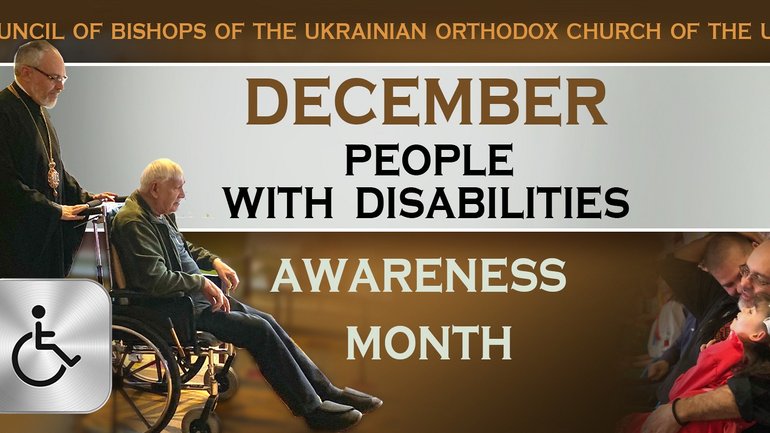Council of Bishops of the Ukrainian Orthodox Church of the USA: December – People with Disabilities Awareness Month

Council of Bishops of the Ukrainian Orthodox Church of the USA: December – People with Disabilities Awareness Month
Council of Bishops of the Ukrainian Orthodox Church of the USA:
December – People with Disabilities Awareness Month
Dear Brothers and Sisters in Christ,
This year’s International Day of People with Disability will be celebrated on Tuesday, 3 December 2019 – thus we prayerfully declare the month of December as a special time of care for the persons with disabilities.
Persons with disabilities are members of our families, our communities, and our churches. We are enriched by the gift of their lives and their contributions. Every one of us is brought into life as a very precious gift, formed by our gracious Creator and loved into life by our parents. We come “wrapped” with a variety of qualities, skills, desires, and needs.
Our Holy Orthodox Church understands every human life to be equal, inherently sacred and worthy of dignity and respect as the bedrock of a just society.
This year will mark the 27th anniversary of this special day (proclaimed by the United Nations in 1992), which promotes an understanding of the issues experienced by people with disabilities and celebrates their achievements.
As a Ukrainian Orthodox community in the United States of America, truly walking in the footsteps of the Good Shepherd, International Day of People with Disability is an opportunity for each one of us to make positive contributions to the lives of 40 million Americans, many of whom are members of our parish communities, with a disability with the hope of breaking down physical, technological, and attitudinal barriers and realizing an inclusive society for everyone.
Within our Church, we are committed to pastoral care of all people, regardless of their life circumstances, thus achieving an inclusive ministerial community that has been blessed to organize and host the St. Nicholas Program for Children with Disabilities, established by the Consistory Office of Youth and Young Adult Ministry (under the leadership of Natalie Kapeluck-Nixon) at All Saints Camp in Emlenton, PA dedicated to high quality support for children with disability and their families living in the communities of our Church and beyond.
We are committed to making our Church a ‘welcoming home’ for all, and it is our hope that in our parishes, the doors are always open to people with disability, and as an Ukrainian Orthodox community, we must ensure that our liturgical life is accessible and inclusive so that everyone is invited to be active in the service of the Church.
We take this opportunity to remind everyone that as people walking in the footsteps of Christ, the Good Shepherd, we have a duty to pray for people with a disability, their families and people who provide them support. We encourage the clergy and faithful of the Church to hold conversations about disability in our parishes, at our workplace, school or community and to show your support for anyone with disability throughout the month of December and always.
The following material is presented for your personal reflection and implementation as we journey through life:
Ten Commandments for Welcoming Persons with Disabilities to Church
- Treat a person with a disability as you would anyone else. Relax when communicating. Rely on natural courtesy, consideration and common sense. Avoid getting flustered or irritated if misunderstandings arise. Repeat yourself if you sense misunderstanding or ask the person to repeat himself or herself if you do not understand.
- Address the individual, not an assistant, interpreter or family member.
- Treat adults with disabilities as adults rather than as children, regardless of the disability.
- Speak at a normal rate, without exaggeration or overemphasis.
- Do not be afraid to ask questions about the person’s disability.
- To facilitate communication, have pads of paper and pencils available in all meeting rooms and other gathering places on parish property. Use them when helpful.
- Allow people to do things for themselves when they want to, even if it takes longer or results in mistakes. Do not always “do for” the person.
- Offer assistance, but do not impose if help is not desired.
- During all gatherings or meetings, allow time to attend to personal needs and rest. Be patient.
- Respect the individual’s personal space and auxiliary aids. Do not lean against or push a wheelchair, pet a service animal in a harness, move wheelchairs, crutches, white canes or other assistive devices out of reach of a person who uses them.
Above all, pray and care for the world around you!
With prayers, wishing you most spiritually rewarding St. Philip’s (Nativity) Fast,
+Antony, Metropolitan
+Jeremiah, Archbishop
+Daniel, Archbishop









